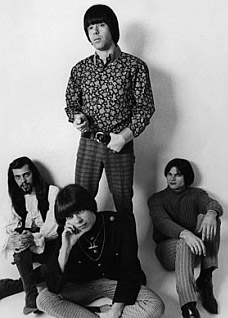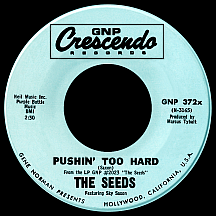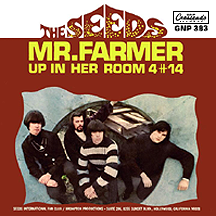THE SEEDS
Pushin' Too Hard
Richard Marsh had a great deal of experimenting, soul-searching and pavement-pounding to do before he came up with the alter-ego that ultimately led to his one year or so of active rock stardom. His Sky Saxon persona, a name he felt had a swashbuckling leading man quality similar to that of Errol Flynn, his favorite actor while growing up, did the trick, though he also fancied himself a "Johnny Appleseed" type, a benevolent purveyor of peace and love, delivering his music to the "Flower Generation" of the '60s. So it made sense for him to head up a band called The Seeds, the name an obvious representation of life and growth...not exactly the meaning most people figured it stood for!
Sometime in the late 1950s, the teenaged Marsh left his home in Salt Lake City and headed to Los Angeles with the resolve to make it as a singer, no matter what. An acetate of a song called "A Starlight Date" has found its way into rock folklore, a recording of which there exists one copy...at most. In 1960 his first tangible release came to life as Dick Marsh on a small label, Rosco; "What Chance Have I," an awkward rock and roll tune, was coupled with teen-type ballad "There's Only One Girl," his vocal high-pitched, nasally, almost space-alien-like...and oddly appropriate considering what came later. He didn't stay with the exact same billing on any of his six pre-Seeds records. He emerged in '61 on the Acama label under Richie Marsh and the Hoodwinks, a collaboration with former 1930s movie star Darla Hood, the fresh-out-of-the-crib cutie-pie of the Our Gang series, 29 by this time with 27 years in show business to her credit including a more recent role in horror film The Bat starring Vincent Price. Unrequited love song "Baby Baby Baby" reveals a way-pre-punk, surely uninentional, vocal peculiarity. Flip side "Half Angel" commands attention mainly due to the backing vocals by Darla, who composed both sides; she made many futile attempts at a singing career in the '50s and '60s.
Richard altered his name (Ritchie Marsh) with "They Say," an uptempo teener demonstrating improvement in vocal and musical arrangement; this 1962 release on miniscule Hollywood label Shepherd preceded one as Little Richie Marsh the following year, "Goodby" the song, Ava the label, still no progress. The Sky Saxon name came to him as an attention-grabbing marquee moniker, "Go Ahead and Cry" resulting on Conquest Records by Sky Saxon and the Soul Rockers (Wiggle-Wobbler Les Cooper had used this band name just months before, but who's quibbling? Sky wasn't the only one to soulrock!), then The Beatles came out of nowhere (okay, Liverpool actually) and changed Sky's (and most everyone's) way of thinking. "Trouble With My Baby" by Sky Saxon and the Electra-Fires, penned by Joe Van Winkle and soon-to-be "'In' Crowd" spokesman Dobie Gray, appeared on pronunciation-puzzler Joie Records.
Ditching Richie for a permanently multi-hued Saxon Sky, he joined three musicians who likewise had traveled to Southern Cal from their respective hometowns. Keyboard player Daryl Hooper, drummer Rick Andridge and Cherokee Indian lead guitarist Jan Savage comprised the original Seeds with Sky, the designated bass player who didn't do much bass playing. They picked up some gigs around L.A. in '65, then Gene Norman, head of GNP Crescendo Records, signed them up and "Can't Seem to Make You Mine" introduced the anguished, whiny Sky Saxon vocal style to precious few who heard the song. Flip side "Daisy Mae" harkened back to rockabilly influences, a sound that wouldn't be explored with future "Purple Bottle" publishing company endeavors. It was tough going; the next single, "You're Pushing Too Hard," Hooper's unique keyboard technique augmenting Sky's agitated vocal, sent a big "Back off!" message, but it wasn't aimed at potential fans. In 1966, as nearby peer band Love scored a couple of hits, there was no such luck, yet, for the Seeds.
They tried again with "Try to Understand," then slapped the song on the flip of the fourth 45, a retitled "Pushin' Too Hard," which caught on second time 'round. Suddenly top ten in L.A. in November '66, it was solid in many western cities but a harder sell east of Arizona, finally squeezing into Billboard's top 40 in February '67. First album The Seeds began to sell, though their sophomore LP had already come out. Next up: "Mr. Farmer," the tale of a hard worker wearing 'seedy clothes' and Sky's offer to '...let me watch...water...harvest your crops!,' top ten locally in February while "Pushin'" was still climbing nationally. "Can't Seem to Make You Mine" made its return, a third L.A. top ten in a row that spring, nearly top 40 nationwide soon after. All the tracks were produced by Marcus Tybalt (actually Sky using another pseudonym), who also supplied appropriately trippy liner notes for the second album, A Web of Sound.

"Lord Tim" Hudson, a British-born disc jockey and personal acquaintance of the Beatles, had been more successful in the U.S. than in his homeland; a former personality in San Diego (at KCBQ) and Los Angeles (at KFWB), he took to the task of managing the Seeds in '67, due partly to Saxon's fascination with all things Fab Four. Hudson encouraged them to move beyond the garage and into more of a Revolver-like expansion. Future resulted, bearing vague comparison to the Beatles' Sgt. Pepper blockbuster unleashed at the same time. "A Thousand Shadows" was the Seeds' airplay contribution to the "Summer of Love," but it ran its course very quickly. Before the group's peak year had ended, a fourth longplay appeared with the title A Full Spoon of Seedy Blues, credited to The Sky Saxon Blues Band, containing mostly originals and one Muddy Waters song, "Plain Spoken." Waters himself endorsed the project, contributing liner notes championing the band as the genuine article ("Blues belongs to the soul, and they've got it!"), though the album sounds more Rolling Stones-influenced than roots-related or Chicago blues-based.
The Seeds appeared on the NBC-TV sitcom The Mothers-In-Law in April 1968 (Eve Arden and Kaye Ballard starred as the amusing moms), lip-syncing "Pushin' Too Hard" (a year-and-a-half late, I'd say) in an episode subtitled How Not to Manage a Rock Group; they went by a fake name, The Warts (perhaps some script writer's subtle comment on how he really felt about rock music), provoking pricelessly perplexed reactions from the show's principal parental figures. Raw & Alive, a concert recording actually done in the studio with added crowd effects and an introduction by KHJ night guy Humble Harve ("...the group that's about to make your feet move and your head spin!"), became their fourth and final GNP album. A brief appearance in the film Psych-Out (set in San Francisco's Haight-Ashbury district), doing "Two Fingers Pointin' on You," a song from the year-old Future, capped the band's semi-successful run. Savage and Andrige departed; Saxon and Hooper kept going with various musicians for a few more years.
There were two singles on MGM in 1970; "Bad Part of Town" and "Love in a Summer Basket" remained consistent with earlier efforts. Afterwards, Saxon forged ahead as a sometimes-solo act, occasionally joining Daryl Hooper for half-the-original-lineup reunions of The Seeds. He led many groups (Thee New Seeds, Universal Stars Peace Band, Fire Wall, Purple Electricity), adding a middle name in the the 1970s after joining a spiritual community called the Source Family. Sky Sunlight Saxon passed away in 2009, having kept busy with one project after another throughout his entire earthly existence.



